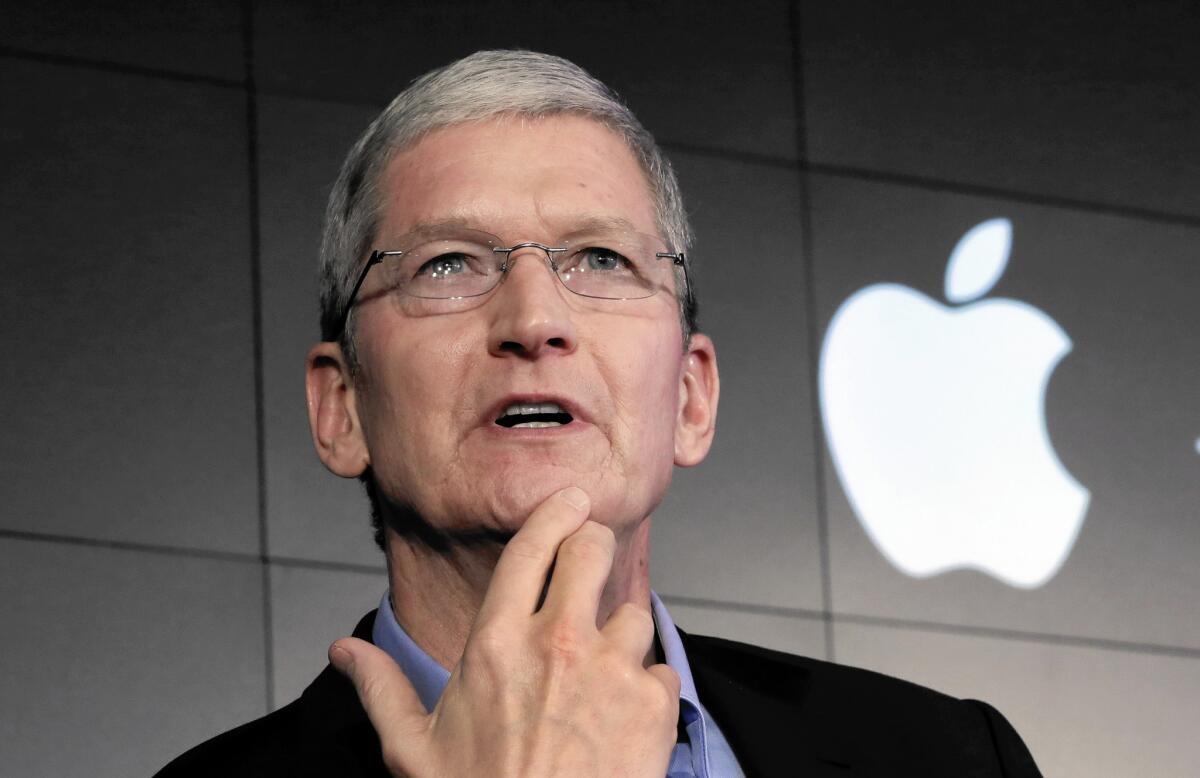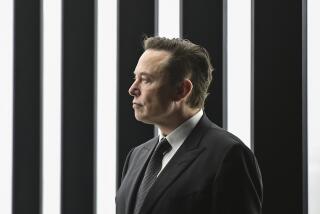Tim Cook’s stance on privacy could define his Apple legacy

- Share via
Unlike his predecessor Steve Jobs, Apple Chief Executive Tim Cook has never shied away from taking a political and social stand.
He was the first head of a Fortune 500 company to come out as gay. He pledged to one day donate his personal fortune to charity, and he talks passionately about the importance of social justice, diversity and the environment.
But it’s his hard-line stance on privacy that could define his legacy at Apple and set the tone for the way big corporations deal with big government at a time when so much of our lives unfold on the devices we use every day.
How far Cook is willing to take the fight is being tested on a national level now. He ramped up the debate Wednesday when he publicly and vehemently opposed a federal judge’s order to provide access to encrypted data on an iPhone belonging to the terrorist couple who killed 14 people in San Bernardino last year.
Challenging the order pits the world’s most formidable tech giant against its most powerful government and puts Cook in the hot seat as the voice of Silicon Valley on a long-contentious issue.
“This is an American company fighting an order from an American court,” said Chenxi Wang, chief strategy officer at Twistlock, a computer and network security firm. “This will absolutely have a ripple effect. Apple is now viewed as the flag bearer for protecting citizen data, and if they succeed, there will be a flood of other companies following suit.”
But Cook has chosen a difficult case on which to stake his position.
Although he has been clear that Apple makes no exceptions in handing over customer data, thwarting the FBI means withholding potentially valuable information that could aid investigation of the deadliest terrorist attack on U.S. soil since 9/11.
Apple is now viewed as the flag bearer for protecting citizen data, and if they succeed, there will be a flood of other companies following suit.
— Chenxi Wang, chief strategy officer, Twistlock
But the typically mild-mannered Cook, 55, has portrayed the issue as a “fundamental human right.”
“I don’t need to know what time you go to bed at night; I don’t want to read your emails; I don’t want to read your texts,” he said at a Laguna Beach tech conference in October. “That’s one of our values as a company.”
As one of the most valuable companies in the world, Apple is far from altruistic — its products are used by millions of people, and the company is thus the gatekeeper to an enormous trove of personal information — and cynics have scoffed when Cook has said he has no interest in customers’ habits when they use his company’s mobile devices, computers and online services. There’s also a strong business incentive to keeping the government out of its products: Being seen as bending over backward for authorities risks alienating customers.
Cook’s resistance, in the form of a sharply worded letter to customers, comes at a time when Washington and Silicon Valley are nearing a boiling point over privacy.
Last month, the White House sent its top national security advisors to meet with leaders of Apple, Facebook and Alphabet (Google’s parent company) to demand more cooperation with law enforcement.
The tech industry, which is still trying to build the political might to match its profits, has been loath to comply, saying a so-called back door into personal data represents a slippery slope.
But many tech executives have been reluctant to speak out the way Cook has. Some haven’t wanted to publicly wade into the heated issue or appear to be sympathetic toward terrorist activity. And most tech companies benefit from mining customer data — or handing it over to advertisers — to sell them even more products.
“Other tech companies have been soft in their stance and quieter,” said Jan Dawson, chief analyst at Jackdaw Research. “They’re somewhat conflicted.”
So time and again, Cook has been at the forefront of the message. As he has settled into his role atop the Cupertino, Calif., tech company, he is increasingly using his clout and global platform to trumpet his views.
Apple maintains a dedicated Web page for its privacy stance, which includes a letter from Cook in which he says: “I want to be absolutely clear that we have never worked with any government agency from any country to create a backdoor in any of our products or services. We have also never allowed access to our servers. And we never will.”
His comments Wednesday received some support from other tech leaders. Jan Koum, co-founder of mobile app WhatsApp, said on Facebook that he “couldn’t agree more with everything” Cook said.
See more of our top stories on Facebook >>
“I have always admired Tim Cook for his stance on privacy and Apple’s efforts to protect user data,” Koum wrote. “We must not allow this dangerous precedent to be set. Today our freedom and our liberty is at stake.”
And late Wednesday afternoon, Google CEO Sundar Pichai offered his take, praising Cook for his “important post.”
“We give law enforcement access to data based on valid legal orders,” Pichai wrote. “But that’s wholly different than requiring companies to enable hacking of customer devices & data. Could be a troubling precedent.”
Cook also has his supporters within an increasingly tech savvy populace that doesn’t seem to mind sharing data with Apple. To them, the executive holds the moral high ground in a post-Edward Snowden age in which government surveillance is seen as overreaching.
A Pew Research poll last year found 54% of Americans disapprove of the U.S. government’s collection of telephone and Internet data to help fight terrorism.
Moreover, 62% of people polled outside the U.S. also oppose U.S. monitoring of American citizens — an important distinction for Apple, which garners 60% of its revenue from overseas markets and has double-downed on China for growth.
In the U.S., digital rights group Fight for the Future is calling for nationwide protests outside Apple stores Tuesday to stop the federal government from seeking private data.
“Governments have been frothing at the mouth hoping for an opportunity to pressure companies like Apple into building back doors into their products to enable more sweeping surveillance,” said Evan Greer, Fight for the Future’s campaign director. “ If the FBI succeeds in forcing Apple to help them hack into an iPhone, it will open the floodgates and set a dangerous precedent that will inevitably lead to more suffering and loss of life.”
Deirdre Mulligan, an associate professor of law in the UC Berkeley School of Information, called Cook’s stance Wednesday a “big, bold statement” about the extent to which the company will go to protect customers’ privacy, as well as its thoughts on how privacy and law enforcement needs should be discussed on a public stage.”
“This is a really important moment in corporate leadership,” she said. “It’s certainly one of the things he’ll be remembered for.”
[email protected] | Twitter: @dhpierson
samantha.masunaga@latimes.com | Twitter: @smasunaga
Times staff writer Tracey Lien in San Francisco contributed to this report.
MORE ON THE APPLE VS. THE FBI
How a passcode has foiled the FBI
The FBI wants Apple to pry into your iPhone
Apple CEO says helping FBI hack into terrorist’s iPhone would be ‘too dangerous’








